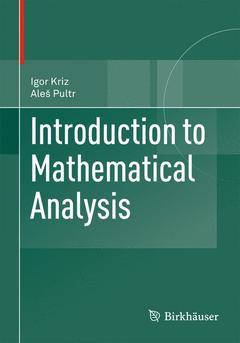Description
Introduction to Mathematical Analysis, 2013
Authors: Kriz Igor, Pultr Aleš
Language: English
Subject for Introduction to Mathematical Analysis:
Approximative price 84.39 €
In Print (Delivery period: 15 days).
Add to cart
Publication date: 08-2013
510 p. · 16.8x24 cm · Paperback
510 p. · 16.8x24 cm · Paperback
Description
/li>Contents
/li>Biography
/li>Comment
/li>
The book begins at the level of an undergraduate student assuming only basic knowledge of calculus in one variable. It rigorously treats topics such as multivariable differential calculus, Lebesgue integral, vector calculus and differential equations. After having built on a solid foundation of topology and linear algebra, the text later expands into more advanced topics such as complex analysis, differential forms, calculus of variations, differential geometry and even functional analysis. Overall, this text provides a unique and well-rounded introduction to the highly developed and multi-faceted subject of mathematical analysis, as understood by a mathematician today.?
Preface.- Introduction.- Part 1. A Rigorous Approach to Advanced Calculus.- 1. Preliminaries.- 2. Metric and Topological Spaces I.- 3. Multivariable Differential Calculus.- 4. Integration I: Multivariable Riemann Integral and Basic Ideas toward the Lebesgue Integral.- 5. Integration II: Measurable Functions, Measure and the Techniques of Lebesgue Integration.- 6. Systems of Ordinary Differential Equations.- 7. System of Linear Differential Equations.- 8. Line Integrals and Green's Theorem.- Part 2. Analysis and Geometry.- 9. An Introduction to Complex Analysis.- 10. Metric and Topological Spaces II.- 11. Multilinear Algebra.- 12. Smooth Manifolds, Differential Forms and Stokes' Theorem.- 13. Calculus of Variations and the Geodesic Equation.- 14. Tensor Calculus and Riemannian Geometry.- 15. Hilbert Spaces I: Definitions and Basic Properties.- 16. Hilbert Spaces II: Examples and Applications.- Appendix A. Linear Algebra I: Vector Spaces.- Appendix B. Linear Algebra II: More about Matrices.- Bibliography.- Index of Symbols.- Index.
Igor Kriz studied in Prague, Czech Republic. He has lived in the United States since 1988 and been teaching at the University of Michigan since 1994. His main interests are geometry and algebraic topology. Aleš Pultr studied in Prague and has been teaching at the Charles University since 1961. His main interests are point-free topology, category theory and combinatorics. Both authors have taught numerous courses of mathematical analysis.
In a single text, the student gets a glimpse of a big picture
The treatment of mathematical analysis is rigorous and self-contained
Can be used not only as a textbook for a course but also as a reference book for lecturers in analysis or mathematicians and scientists in general ?
Includes supplementary material: sn.pub/extras
© 2024 LAVOISIER S.A.S.

